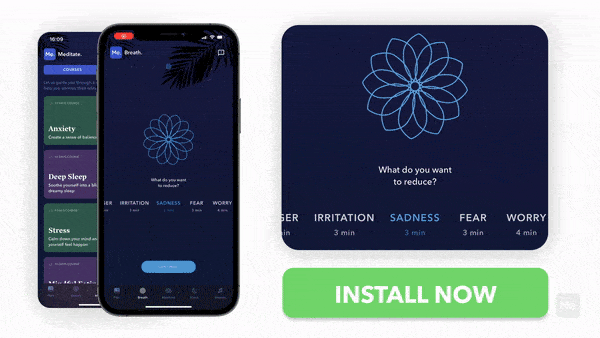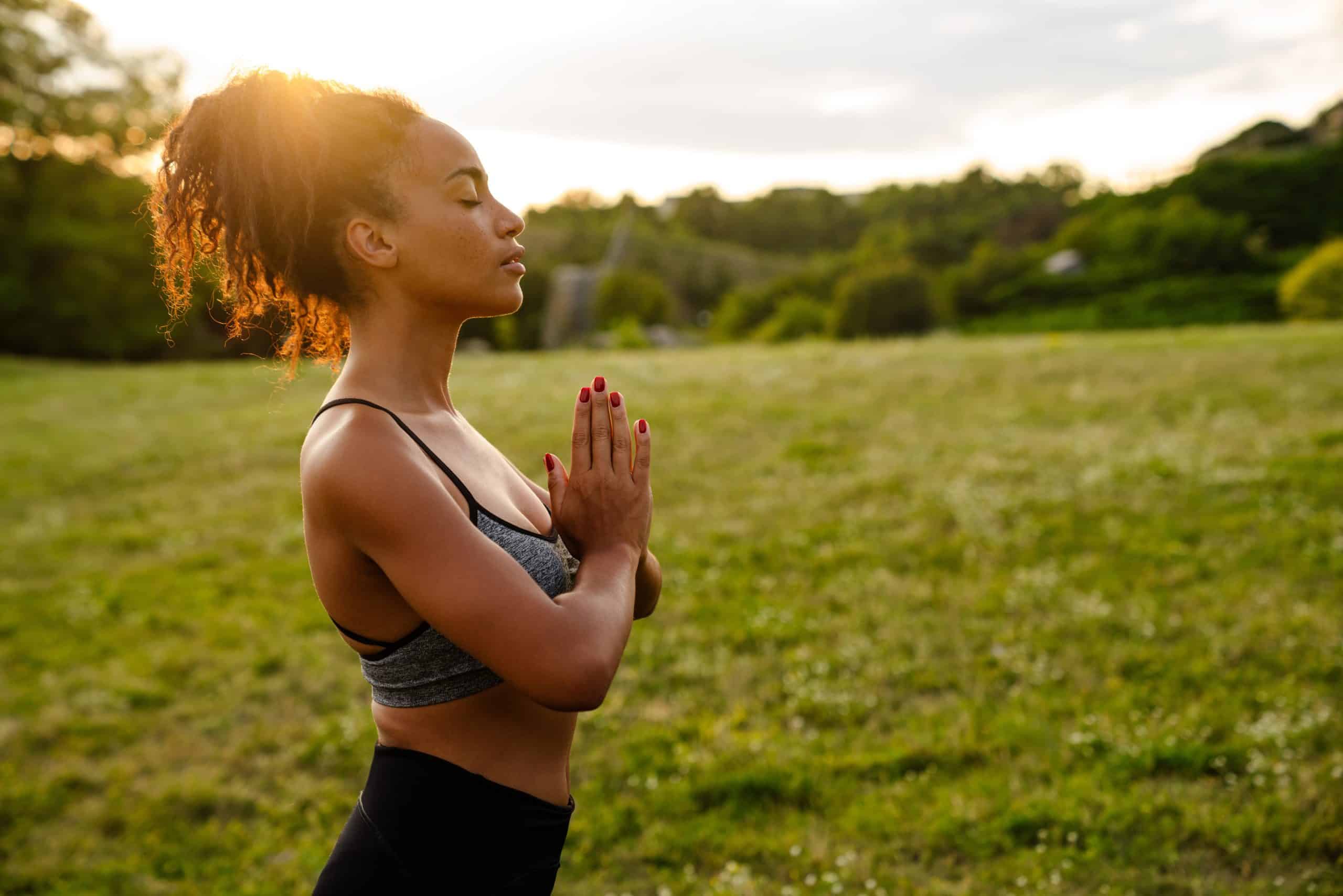Taking 15 minutes out of your day to meditate may seem like a good idea until you actually get to it. If you’re new to meditation, you might find yourself getting frustrated with how hard it is to clear your mind. If you’re a veteran practitioner, you might find yourself bored with your practice. No matter where you are on your meditation journey, hitting a roadblock is totally normal. Here are six common meditation challenges and how to overcome them.
Why Do I Struggle To Meditate?
There’s no “right way” to meditate, which means there’s no such thing as failing at meditation. The goal of meditation is to focus your attention and be present in the moment, but you might experience the following challenges:
Meditation Challenge 1: Your Mind Keeps Wandering Off
“Why can’t I stop thinking about what I have to do later today or what happened yesterday?” One of the most common meditation challenges is letting your mind wander off into thoughts about the past or future. Constant self talk can be exhausting, and it can be hard to turn off the noise in your head.
Try this: It’s natural for your mind to wander, but the goal of meditation is to focus on the present moment. The next time you find your mind wandering during meditation, acknowledge the thought and then let it go.
Don’t try to fight your thoughts or judge yourself for having them. Just observe them and then return your focus to your breath.
To bring your attention back to the present, try a technique called breath counting. This technique will calm down a busy mind and allow you to focus on your meditation.
Here’s how to execute breath counting:
- Inhale, pause, exhale. At the end of your exhale, mentally say “one.” Inhale again and repeat the process.
- Every time you exhale, add one number to your count.
- You can count up to 10 and then start back at one, or you can keep going until you reach 100.
- If your mind wanders off, no problem! Just start counting over at one.
Read More: Meditation State: Find Out How To Induce Deep Meditation
Meditation Challenge 2: You Feel Fidgety And Restless
“I can’t sit still! My legs are falling asleep/my back is killing me/I’m so bored!” It’s totally normal to feel antsy when you first start meditating. After all, we live in a society that is constantly on the go. Our bodies are used to being in motion, so it can be a challenge to sit still for an extended period of time.
Try this: One way to ease into meditation is to start with a shorter practice. If you’ve tried meditating for 20 minutes, try starting with five or 10 minutes.
You can also try active meditation techniques, like walking meditation, that allow you to move your body while you focus on your breath.
If you find yourself getting fidgety while sitting, try this technique called diaphragmatic breathing, and it can help you focus on your breath while also getting some movement into your body:
- Place one hand on your belly and the other hand on your chest.
- As you inhale, feel your belly rise as the air enters your lungs.
- As you exhale, feel your chest fall as the air leaves your lungs.
- Pay attention to the movement of your hands and how it corresponds with your breath.
Other ways to reduce fidgeting and still your body during meditation include:
- Doing a body scan where you focus your attention on each part of your body, starting with your toes and working your way up to your head.
- Tensing and relaxing different muscle groups in your body.
- Holding an object, like a stone or crystal, in your hand during meditation.
- Dispelling some energy through external means like walking or doing some light stretching before you meditate.
Meditation Challenge 3: You Can’t Visualize
Visualization is a powerful tool that can be used during meditation to help you focus your attention. For some people, it comes naturally. But for others, visualization can be a challenge.
Try this: If you’re having trouble visualizing during meditation, try using a guided meditation. Guided meditations often use descriptive language to paint a picture in your mind. This can make it easier to focus and stay in the moment.
Another way to help you visualize is to eliminate all external distractions. Loud noises, bright lights, and other sources of stimulation can make it difficult to focus on your breath and connect with your inner thoughts. Find a quiet place to meditate where you won’t be interrupted, and try to minimize any external stimuli.
Looking for a way to break the vicious cycle of weight loss and tone up all the jiggly parts? Watch the extra pounds fly off and your muscles firm up with the BetterMe app!
Meditation Challenge 4: You Feel Emotional Distress
“I’m feeling so sad/angry/anxious right now. I can’t possibly meditate!” When we sit with ourselves in silence, it’s not unusual for emotions to arise. In fact, it’s one of the reasons why meditation can be so beneficial. It gives us a chance to process our emotions and work through them in a healthy way.
Try this: If you’re feeling emotional distress, try to embrace it rather than push it away. Acknowledge the feeling, and then focus on your breath. Try to breathe into the emotion and let it go.
It can also be helpful to practice a meditation technique called compassionate self-love. In this type of meditation, you focus on sending yourself love and compassion. Start by focusing on your breath, and then say phrases like “I am worthy of love,” “I am enough,” or “I am loved.” Repeat these phrases until you start to feel more relaxed and at ease.
Meditation Challenge 5: You Experience Uncomfortable Sensations In Your Body
It’s common to experience cramps, tingling, itchiness, and other uncomfortable sensations during meditation. These sensations can get in the way of your practice, and they may even make you want to stop meditating altogether.
Try this: If you’re experiencing uncomfortable sensations in your body, check whether your posture is the root cause. Make sure you’re sitting up straight with your spine erect, and your shoulders relaxed. If you’re sitting on the floor, try to sit on a cushion or blanket to elevate your hips and take pressure off your lower back.
Dress for the weather; if it’s cold, make sure you’re wearing warm clothes. And if it’s hot, dress in light, breathable clothing.
Don’t ignore discomfort. If it’s too painful to sit through, take a break. Get up and walk around for a few minutes, or do some gentle stretching. Come back to your meditation when you’re ready.
Meditation Challenge 6: You Keep Nodding Off
Falling asleep during meditation is a common challenge, especially if you’re new to the practice. It can be frustrating, but it’s nothing to worry about. While mental relaxation is one of the benefits of meditation, it’s important to stay alert and not drift off into sleep.
Try this: Inject more energy into your meditation practice by sitting up straight and keeping your eyes open. You can also try stimulating your senses by using a strong scent, like incense or essential oils. Or try listening to music or white noise in the background.
And if all else fails, try meditating at a time when you’re more likely to be awake and alert. For most people, early morning is the best time to meditate.
Meditation Challenge 6: You Feel Disconnected From Your Practice
“I’ve been meditating for years, but I still don’t feel like I’m ‘doing it right.'” There’s no right or wrong way to meditate. The goal is simply to focus on the present moment and connect with your inner thoughts and feelings.
Try this: If you’re feeling disconnected from your practice, it may be because you’re putting too much pressure on yourself to achieve results. Meditation is a process, not a destination. Allow yourself to relax and simply be in the moment, without any expectations.
It can also be helpful to experiment with different meditation techniques. Find one that resonates with you and makes you feel comfortable. If you’re struggling to focus, try mindfulness meditation. Or if you’re looking for more of a challenge, try a mantra meditation or walking meditation.
Taking a break from meditation can also be helpful. If you’ve been meditating every day for weeks or months, try taking a couple of days off. This will give you a chance to miss it and appreciate the benefits of your practice.
Read More: Meditation For Insomnia: Best Techniques To Ensure A Good Night’s Sleep

Are There Any Dangers In Meditation?
Like most things in life, there can be some risks associated with meditation. But these risks are usually related to mental health conditions like anxiety and depression. Some people may find that their symptoms get worse when they start meditating. One may experience intrusive thoughts, for example, or feel like they’re not in control of their thoughts and emotions (3).
If you have a history of mental health issues, it’s important to speak to your doctor before starting a meditation practice. They can help you determine whether meditation is right for you, and they can offer guidance on how to meditate safely.
In general, though, meditation is a safe practice that comes with many benefits.
The Benefits Of Meditation
Below are several science-backed benefits of meditation:
Improves Focus And Concentration
A review of 47 studies found that mindfulness meditation can help people with attention-deficit hyperactivity disorder (ADHD) focus better (2). The participants in the review saw a significant improvement in symptoms, including ADHD symptoms like impulsivity and hyperactivity.
These effects result from changes in the brain. Meditation has been found to increase grey matter in the hippocampus, which is responsible for learning and memory.
It also helps with focus by reducing activity in the “default mode network” — a network of brain regions that are active when we’re not focused on anything in particular.
Reduces Stress And Anxiety
Stress reduction is one of the main reasons people turn to meditation. And there’s good evidence that it works (4). A meta-analysis of nearly 1,300 adults found that mindfulness meditation can help reduce anxiety. It can also help manage stress-related conditions like insomnia and depression.
Mindfulness meditation works by helping you focus on the present moment and become more aware of your thoughts and feelings.
This awareness can help you see your thoughts and emotions for what they are — transient mental states that don’t need to control you. As a result, you’ll be less likely to get wrapped up in anxious or stressful thoughts.
May Reduce Age-Related Memory Loss
Kirtan Kriya is a type of Kundalini meditation that involves chanting, singing, and finger movements.Studies in people with age-related memory loss have found that this practice can improve memory and cognitive function (1).
If you tend to let yourself off the hook, raise the white flag when things get tougher than you expected, send yourself on an unconscious binge-eating trip – BetterMe app is here to help you leave all of these sabotaging habits in the past!
May Help Fight Addiction
Mindfulness meditation can help people recovering from addiction stay present in the moment and resist cravings. It’s also been found to reduce stress and anxiety, which are common triggers for relapse (4).
A study of 60 people in residential treatment for substance abuse found that those who participated in transcendental meditation were less likely to relapse than those who didn’t meditate. The participants who meditated also had lower levels of stress and anxiety.
Improves Sleep
Insomnia is a common problem that can have serious consequences for your health. But meditation may be able to help. It relieves stress and anxiety, which are common causes of insomnia. And it can also improve sleep quality by helping you focus on the present moment and letting go of racing thoughts (4).
Helps With Pain Management
Chronic pain is a common problem that can be debilitating. But meditation can help. It’s been found to be as effective as medication for treating chronic pain.
A study of more than 3,500 adults found that those who participated in meditation-based stress reduction programs had less pain and better sleep than those who didn’t meditate. The participants also used less pain medication (4).
The Bottom Line
While meditation comes with many benefits, it’s not always easy to get started. You might experience some common challenges when you first start meditating. But don’t let that stop you from reaping the rewards of this practice. Use the tips in this article to overcome these challenges and start enjoying the benefits of meditation.
DISCLAIMER:
This article is intended for general informational purposes only and does not serve to address individual circumstances. It is not a substitute for professional advice or help and should not be relied on for making any kind of decision-making. Any action taken as a direct or indirect result of the information in this article is entirely at your own risk and is your sole responsibility.
BetterMe, its content staff, and its medical advisors accept no responsibility for inaccuracies, errors, misstatements, inconsistencies, or omissions and specifically disclaim any liability, loss or risk, personal, professional or otherwise, which may be incurred as a consequence, directly or indirectly, of the use and/or application of any content.
You should always seek the advice of your physician or other qualified health provider with any questions you may have regarding a medical condition or your specific situation. Never disregard professional medical advice or delay seeking it because of BetterMe content. If you suspect or think you may have a medical emergency, call your doctor.
SOURCES:
- A randomized controlled trial of Kundalini yoga in mild cognitive impairment (2017, nih.gov)
- Does mindfulness meditation improve attention in attention deficit hyperactivity disorder? (2015, nih.gov)
- Meditation and Mindfulness: What You Need To Know (2022, nih.gov)
- Meditation: Process and effects (2015, nih.gov)















